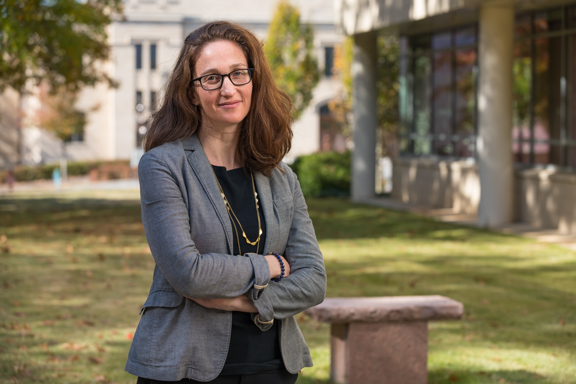Annie Smith, associate professor of law and director of the public service and pro bono program at the U of A School of Law, examines prosecution rates of labor trafficking in “The Underprosecution of Labor Trafficking,” in the January issue of South Carolina Law Review.
Smith finds that while most law enforcement efforts in fighting human trafficking focus on sex trafficking, labor trafficking cases are relatively under-prosecuted. Labor trafficking can take many forms and includes the use of threats, psychological coercion or physical force to compel work.
According to 2019 Federal Human Trafficking Report, roughly 95 percent of the federal human trafficking prosecutions active in 2019 involved sex trafficking; only 5 percent of those prosecutions – 31 total cases nationally – involved labor trafficking.
Smith identifies several causes of the ongoing failure to prosecute labor trafficking, including workplace exceptionalism, the labor trafficking eclipse and maladaptive law enforcement strategies.
She argues that when labor trafficking is not prosecuted, it further normalizes workplace exploitation, reinforces the harmful myth that all human trafficking is sex trafficking and erodes the rule of law. “Approached properly, prosecution presents an opportunity to disrupt labor trafficking, to publicly hold traffickers accountable, to secure restitution for survivors and to gain deeper insight into this form of abuse,” Smith said.
Smith cautions, however, that prosecution of labor trafficking alone is insufficient to confront it. To truly address labor trafficking, she points to the need for “systemic change that fundamentally alters the vulnerability of populations to exploitation and eradicates the extreme power imbalances between workers and those who employ them.”
The article, informed by insights of survivors, anti-trafficking advocates, prosecutors and scholars across disciplines, proposes reforms to strategically increase prosecutions. Some of them include:
- Reallocating resources for prosecutors and law enforcement officers and incentivizing labor trafficking investigations.
- Conducting regional assessments — of populations, places and industries where labor trafficking instances occur—and proactively analyzing data.
- Engaging in strategic partnerships with other federal, state and local agencies, as well as with advocacy groups and other organizations that work on the ground and are most likely to encounter trafficked individuals.
- Improving victim experiences by listening to their story; being honest, fair and transparent; considering the survivor’s gender, ethnicity and race when selecting an officer to interact with them; and offering them options and decision-making power.
Smith's project, the Arkansas Labor Trafficking Awareness Project, was recently funded by the Women’s Giving Circle at the U of A. It aims to increase awareness of labor trafficking among Arkansas professionals who are most likely to come into contact with it and to equip them with adequate resources to respond.
Smith will work with her law students to design and disseminate Arkansas-specific quick reference guides translated into Spanish and Marshallese to educate law enforcement, first responders and service providers on how to identify and respond to labor trafficking. The selected audiences will also receive online on-demand training and educational videos.
Smith teaches Civil Litigation and Advocacy Clinic and Human Trafficking Clinic. She and her students have represented low-wage employees in unpaid wage, human trafficking and other matters. She holds a Bachelor of Arts from Brown University, a Juris Doctor cum laudefrom the University of Wisconsin Law School and a Master of Laws from the George Washington University Law School.
About the University of Arkansas: As Arkansas' flagship institution, the U of A provides an internationally competitive education in more than 200 academic programs. Founded in 1871, the U of A contributes more than $2.2 billion to Arkansas’ economy through the teaching of new knowledge and skills, entrepreneurship and job development, discovery through research and creative activity while also providing training for professional disciplines. The Carnegie Foundation classifies the U of A among the top 3% of U.S. colleges and universities with the highest level of research activity. U.S. News & World Report ranks the U of A among the top public universities in the nation. See how the U of A works to build a better world at Arkansas Research News.
Topics
Contacts
Annie Smith, associate professor
School of Law
479-575-7108, abs006@uark.edu
Yusra Sultana, director of communications
School of Law
479-575-7417,
ysultana@uark.edu
